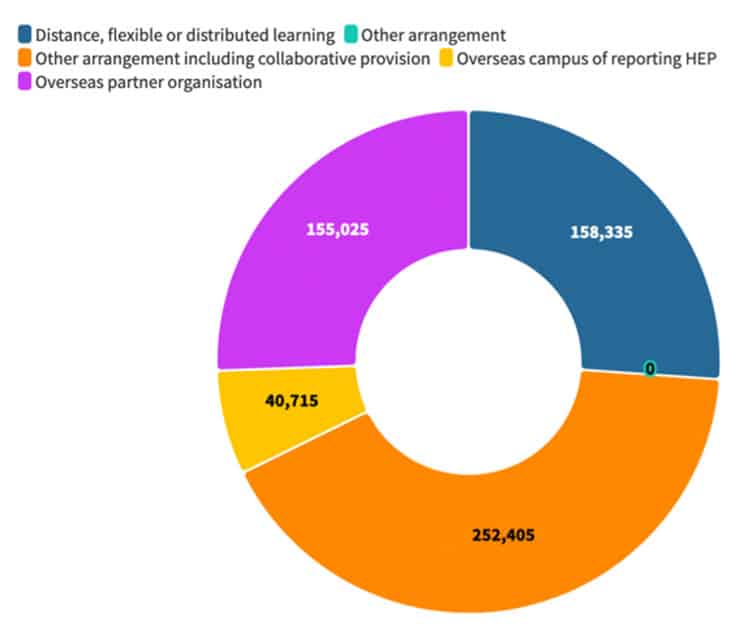Almost as many international students are studying for a UK degree outside of the UK as in it. In 2022/23, 606,485 students across 228 countries took part in some form of transnational education (TNE) delivered by one of 173 UK universities. This may even be an understatement due to a difference in reporting methodology in 2022/23 versus previous years.
Meanwhile, there were 758,855 international students studying at higher education institutions in the UK in 2022/23. The onshore number remained higher that year, but maybe not for long. In part because of tighter immigration settings, visa issuances have been trending down this year and the in-country total is therefore likely to be lower the next time enrolments are tallied. By contrast, UK TNE is almost certainly destined to grow after a healthy 8.8% increase last year in the number of students enrolled in degrees delivered online, in-country, or through partnerships abroad.
Offshore/online delivery has several benefits for international students, including that it is less expensive than travelling for in-campus study in the UK, and that because many elite UK universities participate in TNE, students can access the prestige they want from a higher education degree while remaining in their own region.
Regional breakdown
The dominant region for UK TNE is Asia, which is responsible for half (51.5%) of all enrolments (312,295). Europe is next with 110,750, followed by the Middle East (82,930) Africa (64,790), and North America (29,455). There are also about 3,500 students in South America and 2,930 in Australasia.
The top five markets for UK TNE providers are China, Sri Lanka, Malaysia, Singapore, and Egypt, accounting for a collective 40% of all UK higher education TNE activity. Sri Lanka displaced Malaysia in second place in 2022/23 with 18% y-o-y growth. Malaysia was the only country in the top five to report a decline.
Outside of the top five, the UAE is the fastest-growing TNE market, posting 20.4% year-over-year growth in 2022/23.
Move toward partnerships
There are several categories of TNE, including branch campuses, distance/online learning, joint/dual degrees, and faculty exchanges. But going into 2025, there is a trend emerging: governments open to UK TNE are more interested in internationalising their higher education systems through partnerships than in sending their own students to UK branch campuses.
As reported in University World News, at a British Council “Deep Dialogues” session at the November 2024 Manchester Conference – hosted by the UK’s Quality Assurance Agency (QAA) for Higher Education and the consultancy Education Insight – university and government attendees from 19 countries were asked about the purpose of TNE in their nation. Here are the top five answers, in order:
- “Internationalisation of domestic higher education system”
- “Enhancing the quality of the higher education system”
- “Widening access to higher education”
- “Increasing diversity in higher education”
- “Attracting international talent”
Professor Vangelis Tsiligkiris, founder of the TNE (international) Hub based at Nottingham Trent University in the UK, told University World News:
“The top four answers show why we need to talk about equitable partnerships and the need for host countries to gain something from TNE partnerships. That’s not always clear to the exporting institutions and it should be embedded, but isn’t always, into collaboration.”
Still, partnerships are on the rise. In 2022/23, UK TNE programmes delivered via overseas partner organisations enrolled 155,025 international students, compared with 138,090 in 2021/22. And in 2022/23, TNE provided by “other arrangement including collaborative provision” enrolled 252,405, compared with 225,675 the previous year.

For additional background, please see:
Source

